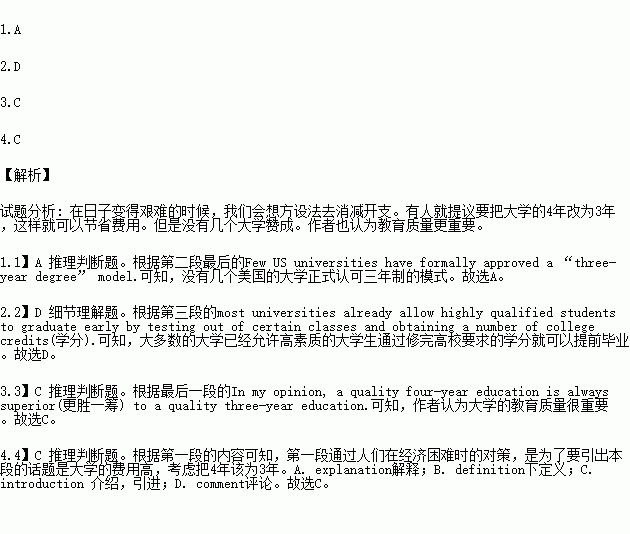题目内容
When times get tough, we all look for ways to cut back. When we’re hungry, we eat at home instead of going out. We take buses instead of taxis. And we wear our old designer jeans just a few months longer. With college expenses at all-time highs, high school students are eager to do anything to cut the cost of a university education.
One cost-cutting proposal(advice) is to allow college students to get a bachelor’ s degree in three years instead of four. Educational institutions have been actively exploring ways to make the learning process more efficient. But there’s a question: Would the quality of undergraduate(本科生)education suffer? Few US universities have formally approved a “three-year degree” model.
I doubt that mainstream North American colleges will carry out a three-year curriculum(课程) any time soon. For one thing, most universities already allow highly qualified students to graduate early by testing out of certain classes and obtaining a number of college credits(学分). In addition, at famous universities, the committee who determine which courses are required and which courses are electives are unlikely to suddenly “throw out” one quarter of the required credits. Professors will resist(oppose) “diluting(稀释)” the quality of the education they offer.
In my opinion, a quality four-year education is always superior(更胜一筹) to a quality three-year education. A college education requires enough time for a student to become skilled in their major and do coursework in fields outside their major. It is not a good idea to water down education, any more than it’ s not a good idea to water down medicine. If we want to help students find their way through university, we should help them understand early on what knowledge and skills they need to have upon graduation. We should allow students to test out of as many courses as possible. We should give them a chance to earn money as interns(实习生)in meaningful part-time jobs that relate to their university studies, such as the five-year co-op program at Northeastern University.
1.We can learn from the passage that ________.
A. most American universities are against the “three-year degree” model
B. many famous US universities are considering adopting the “three-year degree” model
C. professors are willing to accept the “three-year degree” model
D. the “three-year degree” model can make college learning more efficient
2.In most US universities,________.
A. college students are offered the co-op program
B. electives’ credits make up one quarter of the required credits
C. all students are required to finish four-year education before graduation
D. some excellent students can graduate ahead of time
3.We can infer that________.
A. the author is a college professor
B. the author thinks the cost of a university education is too high for people to afford
C. the author considers the university education quality very important
D. the author pays special attention to the all-round development of college students
4.The first paragraph serves as a(n)________.
A. explanation B. definition
C. introduction D. comment
书面表达
近段时间你发现校园内浪费现象严重,请你在班会上发表演讲,谈谈你所看到的浪费现象及危害,并就这一现象发表个人见解。
浪费现象 | 1. 不关水、不关教室的电灯 2. 食堂里的桌子上丢满食物 3. 校园里乱丢纸张、书本 |
造成危害 | 1. 浪费资源 2. 形成坏习惯,不利于品德养成 3. 浪费金钱,增加父母经济负担 |
个人认识 | 适当发挥 |
注意:1. 词数100左右;
2. 演讲的开头和结尾已写好,不计入总词数。
参考词汇:食堂canteen 给某人增加经济负担 add financial burden to sb
Dear friends,
May I have your attention, please? Now I’d like to make a speech here.
_____________________________________________________________________
_____________________________________________________________________
_____________________________________________________________________
That’s all. Thank you!



